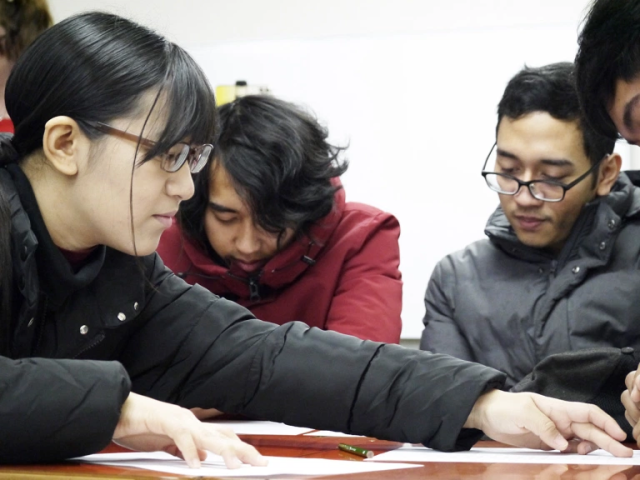
Tokyo language school shows students a kind of Japanese you won’t find in textbooks, but that you’ll definitely want in your skill set.
One of the big hurdles in learning Japanese is that textbook Japanese doesn’t always match up with how the language is actually spoken. Sure, sometimes it does, but the style of Japanese you’ll learn in most classrooms is a proper, formal way of speaking. It’s useful if you’re talking to a hotel clerk, restaurant server, or business colleague, but when talking with friends or other casual conversation partners, spoken Japanese grammar and vocabulary bend to become a lot snappier and more expressive.
So while it’s critical to start with a solid understanding of proper speech patterns, it’s nice to find a school that’s willing to teach less formal forms of communication too, like Tokyo’s Hotsuma International School does. Over the last few years, our Japanese-language reporter Seiji Nakazawa has had multiple opportunities to spend time with Hotsuma’s foreign students who have come to Japan to study the language, but last week was his first time to sit in on a class, and the lesson was unlike any he’d ever seen before.
▼ Seiji’s Pakistani friend Raza, a Hotsuma student, was happy to see our reporter, if a little disappointed that this visit wasn’t connected to a beach run or free fried chicken.
As Seiji took a seat at the back of the classroom, he noticed that the instructors seemed especially enthusiastic, and that’s because they’re actually a pair of professional comedians! Japanese husband Manu and Swiss wife Shira together form the duo Franponais, who specialize in the two-person Japanese comedy acts called manzai.
Franponais teaches a special class at Hotsuma called Learning Japanese with Manzai. They start by explaining some of the basics of the art form, like how most gags require one person to take a silly airheaded role, while the other reacts with shocked seriousness to their partner’s shenanigans. Because manzai are structured as a conversation between two people, the tone is casual and conversational, exactly the sort of thing that’s lacking from most classroom Japanese-language instruction.
▼ Manu, who can speak five different languages, explained everything in clear, easy-to-follow Japanese.
Franponais then performed a quick example before giving the students their assignment: to form pairs and create, then perform, their own manzai acts.
Seiji likes a good laugh as much as the next guy, but he couldn’t help but wonder if Hotsuma’s students could pull this off. Comedy can’t be stiff and formal. It needs to be loose and energetic, with timing, inflection, and emotion all key elements. Even as a native Japanese speaker, he’d have a tough time if someone told him to create his own manzai act, and he couldn’t imagine doing it in a foreign language.
But the Hotsuma students threw themselves into the project, with their instructors hovering about to offer assistance and provide feedback.
Eventually, it was time for the students to perform their manzai skits…
…and sure enough…
…they were funny!
▼ Learning Japanese with Manzai
For Seiji, who only speaks Japanese, it was heartwarming and inspiring to see the students working hard not only to communicate, but to make people smile with their advancing Japanese skills, and having come all the way to Japan to do it. “After finishing their courses at Hostuma, some of them will look for jobs, while others will apply for other educational programs in Japan,” says Seiji. “Chasing after their dreams won’t be easy, but I think this time in their life, when they studied and laughed so hard, is a memory they’ll treasure, and I hope they’ll al be smiling in the future too.”
Related: Hotsuma International School
Photos, video ©SoraNews24
● Want to hear about SoraNews24’s latest articles as soon as they’re published? Follow us on Facebook and Twitter!
[ Read in Japanese ]

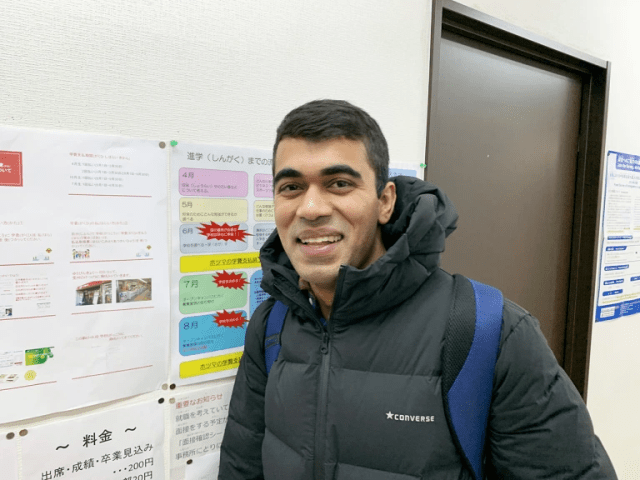
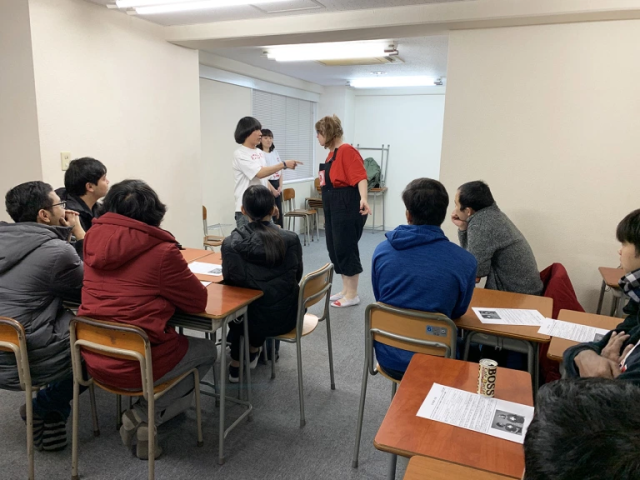
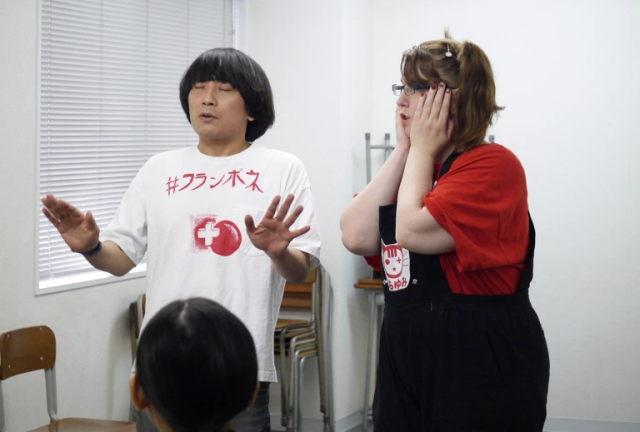

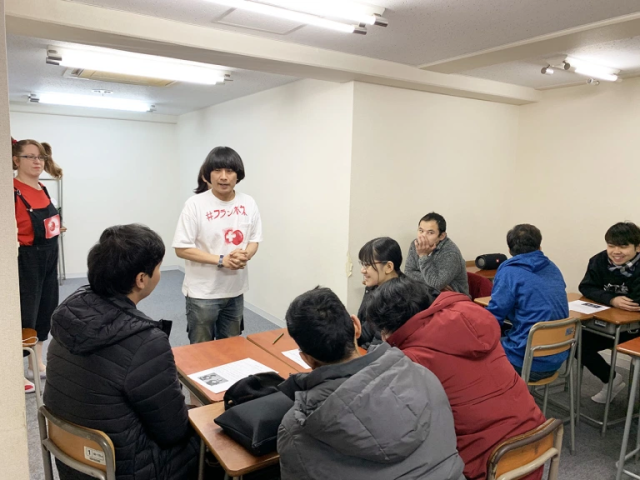
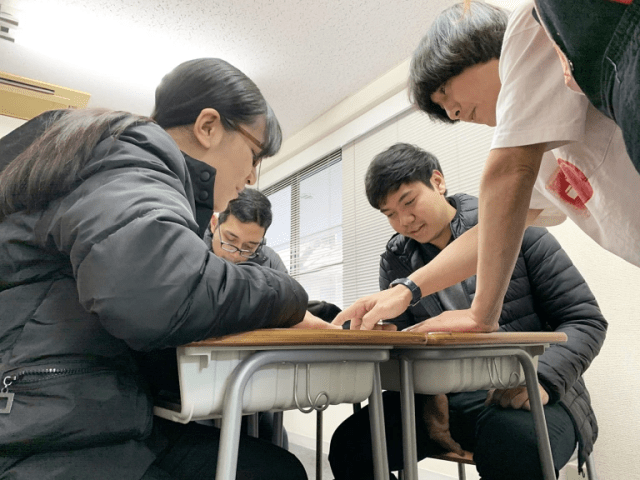

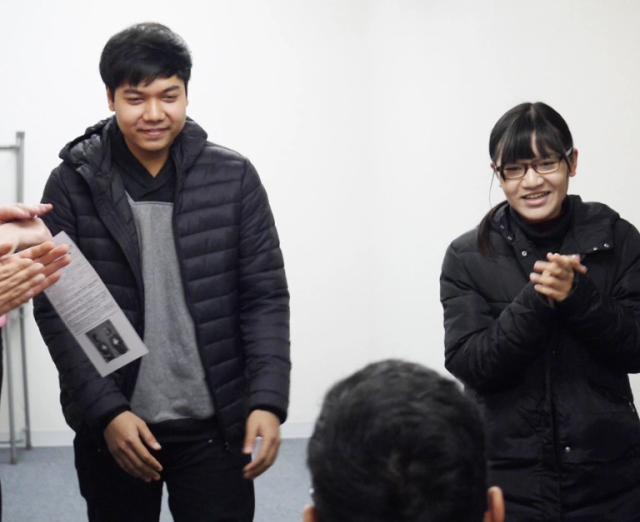
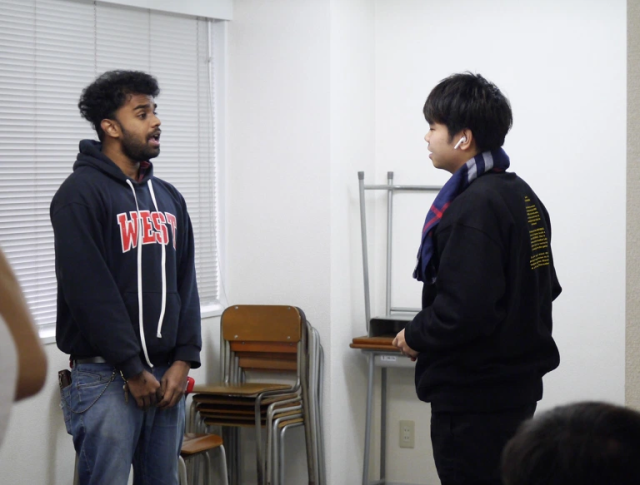
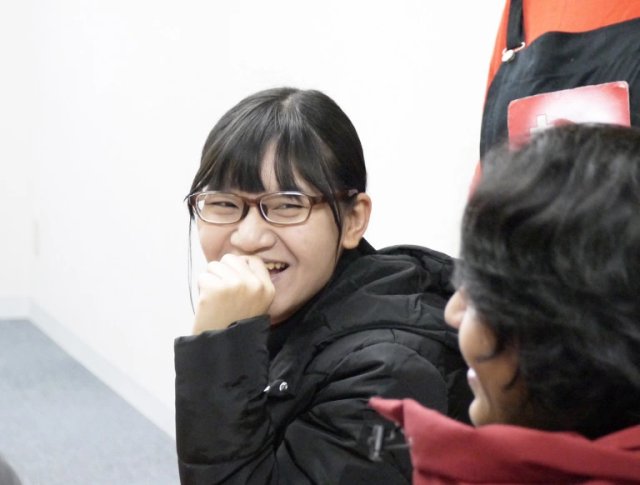
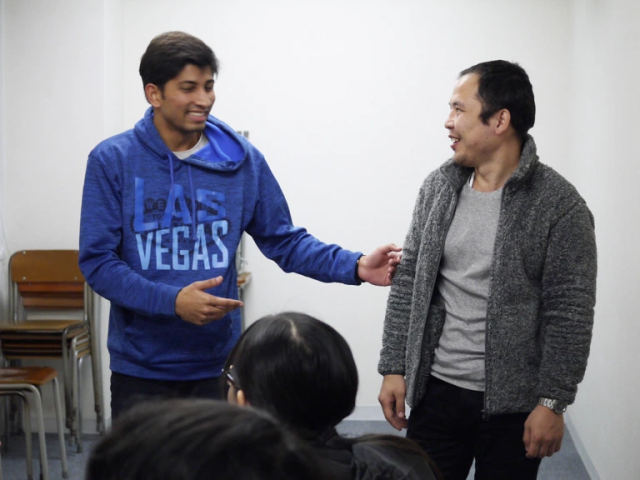
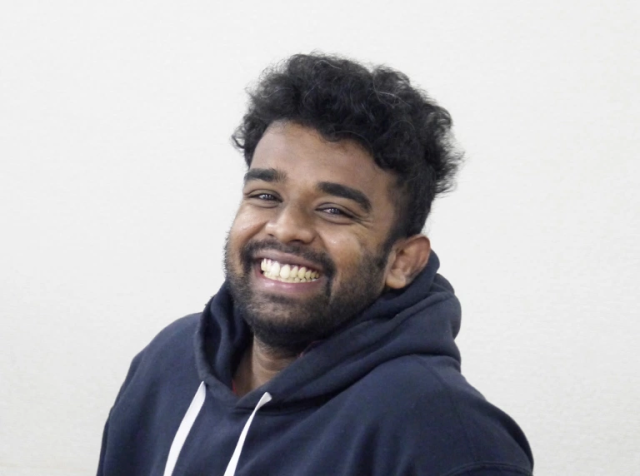

 What’s wrong with English education in Japan? Pull up a chair…
What’s wrong with English education in Japan? Pull up a chair… The Japanese you learn at school vs the Japanese used in Japan【Video】
The Japanese you learn at school vs the Japanese used in Japan【Video】 Foreign English teacher in Japan calls student’s ability garbage, says it was an “American joke”
Foreign English teacher in Japan calls student’s ability garbage, says it was an “American joke” These Pakistani students in Tokyo had never been to the beach, and that’s something we had to fix
These Pakistani students in Tokyo had never been to the beach, and that’s something we had to fix English conversation school in Japan has clever reminder that students don’t have to be perfect
English conversation school in Japan has clever reminder that students don’t have to be perfect Japanese ramen restaurants under pressure from new yen banknotes
Japanese ramen restaurants under pressure from new yen banknotes McDonald’s new Happy Meals offer up cute and practical Sanrio lifestyle goods
McDonald’s new Happy Meals offer up cute and practical Sanrio lifestyle goods French Fries Bread in Tokyo’s Shibuya becomes a hit on social media
French Fries Bread in Tokyo’s Shibuya becomes a hit on social media New private rooms on Tokaido Shinkansen change the way we travel from Tokyo to Kyoto
New private rooms on Tokaido Shinkansen change the way we travel from Tokyo to Kyoto Secret Kitchen bento serves Japanese flowers, birds, wind and moon in a box, but is it worth it?
Secret Kitchen bento serves Japanese flowers, birds, wind and moon in a box, but is it worth it? Sakura tree falls on man at Sannenzaka near Kiyomizu temple in Kyoto 【Breaking News】
Sakura tree falls on man at Sannenzaka near Kiyomizu temple in Kyoto 【Breaking News】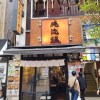 Non-ramen Ramen Restaurant Stars: The quest begins at Tokyo’s Oreryu Shio
Non-ramen Ramen Restaurant Stars: The quest begins at Tokyo’s Oreryu Shio We tried Korea’s way-too-big King Tonkatsu Burger at Lotteria 【Taste Test】
We tried Korea’s way-too-big King Tonkatsu Burger at Lotteria 【Taste Test】 Better than Apple EarPods? Our 100 yen shop earphone showdown finds a true champion
Better than Apple EarPods? Our 100 yen shop earphone showdown finds a true champion Cosplay in front of explosions and flames at the upcoming fiery Baku Festival
Cosplay in front of explosions and flames at the upcoming fiery Baku Festival All-you-can-drink Starbucks and amazing views part of Tokyo’s new 170 meter-high sky lounge
All-you-can-drink Starbucks and amazing views part of Tokyo’s new 170 meter-high sky lounge More foreign tourists than ever before in history visited Japan last month
More foreign tourists than ever before in history visited Japan last month Starbucks reopens at Shibuya Scramble Crossing with new look and design concept
Starbucks reopens at Shibuya Scramble Crossing with new look and design concept Studio Ghibli releases new action figures featuring Nausicaä of the Valley of the Wind characters
Studio Ghibli releases new action figures featuring Nausicaä of the Valley of the Wind characters Studio Ghibli glasses cases let anime characters keep an eye on your spectacles
Studio Ghibli glasses cases let anime characters keep an eye on your spectacles Is the new Shinkansen Train Desk ticket worth it?
Is the new Shinkansen Train Desk ticket worth it? Beautiful Ghibli sealing wax kits let you create accessories and elegant letter decorations【Pics】
Beautiful Ghibli sealing wax kits let you create accessories and elegant letter decorations【Pics】 Studio Ghibli releases Kiki’s Delivery Service chocolate cake pouches in Japan
Studio Ghibli releases Kiki’s Delivery Service chocolate cake pouches in Japan New definition of “Japanese whiskey” goes into effect to prevent fakes from fooling overseas buyers
New definition of “Japanese whiskey” goes into effect to prevent fakes from fooling overseas buyers Our Japanese reporter visits Costco in the U.S., finds super American and very Japanese things
Our Japanese reporter visits Costco in the U.S., finds super American and very Japanese things Studio Ghibli unveils Mother’s Day gift set that captures the love in My Neighbour Totoro
Studio Ghibli unveils Mother’s Day gift set that captures the love in My Neighbour Totoro Domino’s Japan now sells…pizza ears?
Domino’s Japan now sells…pizza ears? New Japanese KitKat flavour stars Sanrio characters, including Hello Kitty
New Japanese KitKat flavour stars Sanrio characters, including Hello Kitty New Pokémon cakes let you eat your way through Pikachu and all the Eevee evolutions
New Pokémon cakes let you eat your way through Pikachu and all the Eevee evolutions Sales of Japan’s most convenient train ticket/shopping payment cards suspended indefinitely
Sales of Japan’s most convenient train ticket/shopping payment cards suspended indefinitely Sold-out Studio Ghibli desktop humidifiers are back so Totoro can help you through the dry season
Sold-out Studio Ghibli desktop humidifiers are back so Totoro can help you through the dry season Japanese government to make first change to romanization spelling rules since the 1950s
Japanese government to make first change to romanization spelling rules since the 1950s Ghibli founders Toshio Suzuki and Hayao Miyazaki contribute to Japanese whisky Totoro label design
Ghibli founders Toshio Suzuki and Hayao Miyazaki contribute to Japanese whisky Totoro label design Doraemon found buried at sea as scene from 1993 anime becomes real life【Photos】
Doraemon found buried at sea as scene from 1993 anime becomes real life【Photos】 Tokyo’s most famous Starbucks is closed
Tokyo’s most famous Starbucks is closed One Piece characters’ nationalities revealed, but fans have mixed opinions
One Piece characters’ nationalities revealed, but fans have mixed opinions We asked a Uniqlo employee what four things we should buy and their suggestions didn’t disappoint
We asked a Uniqlo employee what four things we should buy and their suggestions didn’t disappoint Princesses, fruits, and blacksmiths: Study reveals the 30 most unusual family names in Japan
Princesses, fruits, and blacksmiths: Study reveals the 30 most unusual family names in Japan Tired of wasting paper practicing your kanji? Try these reusable water-activated practice sheets
Tired of wasting paper practicing your kanji? Try these reusable water-activated practice sheets American English teacher fired from Japanese high school after exposing genitals
American English teacher fired from Japanese high school after exposing genitals Knife-wielding professor fired from international department of one of Tokyo’s top universities
Knife-wielding professor fired from international department of one of Tokyo’s top universities Foreign English teachers in Japan pick their favorite Japanese-language phrases【Survey】
Foreign English teachers in Japan pick their favorite Japanese-language phrases【Survey】 Over half of Japanese students in nationwide test score zero percent in English speaking section
Over half of Japanese students in nationwide test score zero percent in English speaking section Japanese cram school gives students permission to smash window, break into building on test day
Japanese cram school gives students permission to smash window, break into building on test day RocketNews24’s six top tips for learning Japanese
RocketNews24’s six top tips for learning Japanese North Japan prefecture creates guide to help new foreign workers understand local language quirks
North Japan prefecture creates guide to help new foreign workers understand local language quirks Are Japan’s efforts at internationalization succeeding or not?
Are Japan’s efforts at internationalization succeeding or not? Japan’s most famous anime/manga artist trade school now has a fully online program
Japan’s most famous anime/manga artist trade school now has a fully online program Westerners in Japan – do they really ALL speak English? 【Video】
Westerners in Japan – do they really ALL speak English? 【Video】 Students go nearly a year without textbooks after teacher forgets to hand them out
Students go nearly a year without textbooks after teacher forgets to hand them out Nihon-no: Is an entirely English-speaking village coming to Tokyo?
Nihon-no: Is an entirely English-speaking village coming to Tokyo? Put away your textbooks, kids – the key to learning Japanese is Minecraft
Put away your textbooks, kids – the key to learning Japanese is Minecraft 1 in 20 Japanese junior high school students regularly missing school, government study finds
1 in 20 Japanese junior high school students regularly missing school, government study finds
Leave a Reply